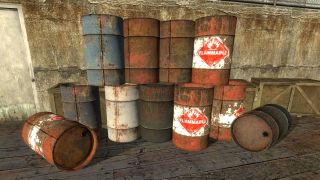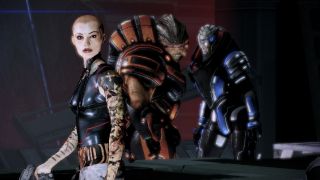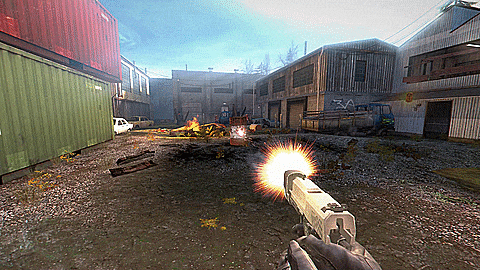PC gaming clichés we don't hate
Just because it's overused doesn't mean it's bad.

Like any medium, videogames are rife with clichés. But sometimes there's comfort in a cliché. And so here's a celebration of overused gaming tropes that, actually, we quite like, despite the fact they're overused.
Guess it was just rats
I don't want guards in stealth games who realistically investigate repeated sounds as if that's their actual job. I want comedy guards who have a quick look around while I hide under the stairs, then say out loud to no one, "Probably just the wind," before returning to their patrol route humming tunelessly to themselves. —Jody Macgregor
Crouch to disappear
In all but the most detailed stealth games, hiding tends to involve very simple actions: standing in a dark place or in some tall grass, and crouching. Voila! Complete invisibility. NPCs can walk right past you, utterly oblivious. Heck, sometimes you don't even need the darkness or the grass. I'm remembering walking past someone in The Elder Scrolls 4: Oblivion, popping a squat, and standing right behind them. It kind of makes sense that at half-height you'll be harder to see and thus stealthier.
It's logical enough to work as an easily understood game mechanic. But thinking about the reality of it for a few seconds just makes me laugh. How thick is this grass, that you really can't see me crouching in it? How oblivious does someone have to be to not feel the presence of someone awkwardly crouch-shuffling behind them? It's stupid as hell and I love it. —Wes Fenlon
Assembling a team
I am a sucker for putting together a squad of highly skilled specialists then watching them bond and form a cohesive unit, perhaps even becoming a family. I will drink that by the gallon.
There's an element of it in every party-based RPG, but Mass Effect 2 probably does it best. I have to go on a bunch of missions to recruit people so I can then take them all on one big super-important final mission? Sign me up. The Saints Row series do it well too, with each game adding a couple of new members to the gang with different specialties as well as personality clashes to resolve. Then in Saints Row 4 you have to reunite all the scattered Saints, putting your band back together, which is a concentrated dose of the same high. —Jody

Keycard monster traps
You know the trope. You grab a keycard or a shotgun, which is usually sitting tantalisingly beneath a spotlight to really draw your attention to it. Then, as soon as you grab it, the lights go out and the room floods with monsters. Doom might be the first game that did this, but it's since appeared in BioShock, Resident Evil, and many more horror or horror-adjacent games. It's overused, yeah, but I like it, because I know it's going to happen. It's almost like the developers are winking at you, nudging you in the ribs. I can stomach a cliché more if it's a knowing cliché. —Andy Kelly
The biggest gaming news, reviews and hardware deals
Keep up to date with the most important stories and the best deals, as picked by the PC Gamer team.
Pointlessly smashing pots, barrels, etc.

—Wes
"You take the one on the left"
You're sneaking through a level, when—oh no—two guards! And they're standing in view of each other! Disaster. Only, you've also got an NPC companion, likely a grizzled veteran with years of stealthily crouch-walking through hostile territory under his tactical vest. "You take the one on the left," he orders, setting up a synchronised takedown that keeps your mission alive. This trope is a mainstay of Call of Duty campaigns, as well as the series' many, many imitators, and it always feels cool. Bonus points for when co-op campaigns allow this, letting you make the call yourself. For all of Ghost Recon: Wildlands' many problems, coordinating stealth kills never got old. —Phil Savage
The bit in every videogame where they show you the final boss early on but there's a minor obstacle in the way that you inexplicably can't overcome for at least ~20 hours of gameplay
It sounds like I hate this particular action adventure trope, but I really don't. In order to set up a truly despicable villain you've got to dangle their smug face in front of me very early on and have them say something like "you have no idea what you're messing with". The ensuing rage from that event alone will carry me through the rest of the game, until that moment when I can kick them square in the face. Without that frustrating first bit, the face punt wouldn't be nearly as satisfying. —Jacob Ridley

Exploding Red Barrels
I've been covering games for two decades, throughout which my peers have dumped on explosive barrels as key exemplars of lazy design. But this is the critique of a coward. It's like hating on Air Jordans, the climax of Madonna's Like a Prayer, or the colour yellow for being too perfect. Some things are iconic because they arrived perfectly formed, were instantly loved, and remain so good that to this day you're unlikely to ever get bored of them. As a concept, the dangerously volatile barrel is a classic of this magnitude.
It doesn't matter whether they're dressed up as alien fuel cells, giant vats of demonic ichor, or whatever exploded best in the middle ages. I dunno, distilled peasant tears? The fact remains that blowing shit up is, and always has been, the best fun. Not to mention red barrel placement (be real, it's even better when they're just the OG red barrels, like beautiful exploding cans of Classic Coke) does actually make for fun risk/reward design. The risk being you gib yourself. The reward being you don't. Now that's a gameplay loop. —Tim Clark
A timely headshot to save a vital NPC
You round the corner, or open some door, to find your partner/ lover/parent/friend held at gunpoint or knifepoint (weaponpoint?) by a generally pretty expendable game baddy and have limited time to perform a heroic headshot to save their life. It's hammy, all-too-common, but I still get a kick out of pretending I'm some sort of crackshot like Andy Garcia in The Untouchables.
My only issue is that it's almost always a game-ending failure. Miss the shot, they die, it's reload your save time. Would be nice if just once a game would up the ante and make failure an option. —Dave James

Emerging from a tunnel to a dramatic first look at an open world
Bethesda's Fallout games do this masterfully. They keep you indoors, or in a cave—anywhere claustrophobic, and then gently guide you towards an exit that reveals a carefully designed vista. RPGs often start in a dungeon because it's a convenient, linear way to teach you rules and let you get to grips with the systems, but as open worlds have become more glamorous, that moment when you finally emerge blinking into the sunlight has become a staple that I will never tire of. Developers love to use excessive bloom in these moments. Your whiteout vision slowly clarifies into a vista stretching for miles and miles, and in those seconds you know the adventure has truly begun. —Tom Senior
The world is in imminent danger, but I still have time to gather 5/5 blackberries
An ancient evil is threatening to destroy the world, or maybe the entire universe. As all life hovers on the brink of extinction, you're the only one who can stop the impending doom.
But, you know, the impending doom will wait until you're completely ready to deal with it. If you have other things you want to do, like deliver 10/10 carrot plants to the market, or help some nice villager with the rats in her basement, or level up your crafting skills by making 2,000 daggers. Go ahead! The doom isn't in a rush.
It makes zero sense that the evil wouldn't just invade and destroy everything on its timetable, not yours, but that would also suck. So as silly and cliché at it is, I appreciate that I can save the world after I've picked all the blackberries I want. —Chris Livingston
If it’s set in space, Andy will probably write about it. He loves sci-fi, adventure games, taking screenshots, Twin Peaks, weird sims, Alien: Isolation, and anything with a good story.
Most Popular

